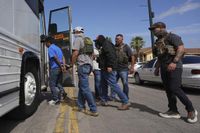On August 8, 2025, Nevada Governor Joe Lombardo, a Republican, confirmed plans to activate the Nevada National Guard to assist U.S. Immigration and Customs Enforcement (ICE) in what his office described as a “temporary, administrative capacity.” The move, which comes at a time of heightened national debate over immigration enforcement, has sparked fierce reactions across Nevada’s political and civic landscape, drawing both praise and condemnation.
According to Lombardo’s spokesperson Elizabeth Ray, the National Guard’s deployment will last for several weeks and will focus on non-public-facing work. This means guardsmen will not be directly apprehending or detaining undocumented immigrants. Instead, they will be providing clerical, administrative, and logistical support—tasks such as case management, transportation, and assistance with in- and out-processing at ICE detention facilities. As reported by The Nevada Independent, about 35 guardsmen, representing less than 1% of the state’s National Guard, will participate, with all costs covered by the federal government.
The Secretary of Defense has authorized these operations to continue through November 15, 2025. The legal framework for the deployment is Title 32, which allows the governor to keep the troops under state control while the federal government pays their salaries and benefits. This arrangement is significant, as it opens the door for the National Guard to be used for domestic law enforcement support, though Lombardo’s office insists the Nevada troops will not be involved in direct enforcement actions.
The decision aligns Nevada with about 20 other Republican-led states, including Texas, Florida, Louisiana, Virginia, and Georgia, whose governors have also agreed to send their National Guards to assist ICE. The Defense Department’s push for National Guard support is part of a broader effort to bolster the Trump administration’s mass deportation campaign, which has seen a dramatic uptick in immigration arrests. In fact, ICE arrests in Nevada have surged more than 300% compared to the same period last year, as noted by The Nevada Independent.
Governor Lombardo’s move follows his December 2024 commitment, along with 25 other Republican governors, to support President Donald Trump’s deportation plans. The joint statement declared their readiness to “utilize every tool at our disposal,” including the National Guard, to assist in the removal of “dangerous criminals, gang members, and terrorists.” Yet, the scope of the current deployment is broader, encompassing administrative support for mass deportation efforts beyond just targeting those categories.
The reaction from Nevada’s Democratic leaders and advocacy groups was swift and scathing. State Senator Fabian Doñate, a Democrat and member of the Nevada Latino Legislative Caucus, called Lombardo’s decision “a profound betrayal of the trust of our communities.” He argued, “The National Guard should be a protector of Nevadans, not a tool for political agendas that divide our families and our communities.” Doñate further warned of severe economic and social consequences, predicting reduced school attendance, fewer workers, and a drop in consumer spending as fear spreads through immigrant communities.
Assemblymember Cinthia Moore, who represents East Las Vegas, echoed these concerns. She said the Latino caucus is actively seeking legislative responses and noted that business owners in her district have already reported a significant decline in customers, forcing some to lay off workers. Moore expressed frustration with Lombardo’s alignment with Trump, suggesting it was a calculated move to bolster his prospects for the 2026 gubernatorial election. “We will remember this in November, and we will keep reminding Nevadans of what Lombardo is doing,” Moore stated, according to the Las Vegas Sun.
U.S. Representative Dina Titus, another Democrat, was even more pointed in her criticism. “The Nevada National Guard’s mission is to protect us, not sow more fear in our communities by doing Trump’s dirty work,” Titus said on X (formerly Twitter), as reported by The Nevada Independent. The Nevada Latino Legislative Caucus also issued a statement Friday evening, accusing Lombardo of choosing “Trump over Nevada” and warning that mass deportations would “devastate Nevada’s families, our economy, and our reputation.” The caucus predicted that tourists would be scared away, small businesses would lose workers, neighborhoods would become militarized, and children would fear going to school.
The Nevada Immigration Coalition joined the chorus of disapproval, stating, “The Trump-Lombardo agenda has fractured families and already negatively impacted Nevada’s tourism-dependent economy. It’s shameful that Lombardo has bent the knee to Trump.”
For many critics, Lombardo’s decision is particularly notable given the precedent set by his Republican predecessor, Brian Sandoval, who resisted calls to deploy the National Guard for immigration enforcement during Trump’s first term. “Nevada Republicans have moved so far right they’re unrecognizable,” Doñate remarked, drawing a sharp contrast between the current and former governors.
Supporters of the deployment, however, point to the scale of undocumented immigration in Nevada and the need for federal-state cooperation to address it. The American Immigration Council estimates that nearly 200,000 undocumented immigrants live in Nevada, making up about 9% of the state’s workforce. Over 170,000 U.S. citizens in Nevada live with at least one undocumented family member. Proponents argue that the administrative support provided by the National Guard will free up ICE agents to focus on enforcement, thereby enhancing public safety and upholding the rule of law. They also emphasize that the deployment is temporary, administrative, and federally funded, minimizing the impact on state resources.
The deployment comes at a time when Nevada’s entire state was designated a “sanctuary state” by the federal government on August 5, 2025—a move that could threaten millions in federal funding. The designation followed an executive order directing federal agencies to “pursue all necessary legal remedies and enforcement measures to end these violations and bring such jurisdictions into compliance with the laws of the United States.” While the exact reasons for Nevada’s designation remain unclear, the state’s large undocumented population and local policies limiting cooperation with federal immigration authorities likely played a role.
Nationally, the use of the National Guard for immigration enforcement has a mixed history. The Council on Foreign Relations notes that while the Guard is typically used for natural disasters and civil unrest, it has occasionally supported border security and related administrative tasks. The current wave of deployments, however, marks a significant escalation, with multiple states joining a coordinated federal effort to expedite deportations.
Not all Republican governors have embraced the strategy. Vermont Governor Phil Scott, for example, declined to authorize his state’s National Guard for ICE support, citing “concern for the tactics, and disruption that some of those tactics are causing, in workplaces and communities.”
As the debate continues, Nevada’s immigrant communities brace for the impact of the National Guard’s involvement in ICE operations. The full consequences—economic, social, and political—remain to be seen. For now, the state finds itself at the center of a national controversy, with its leaders divided and its future uncertain.




